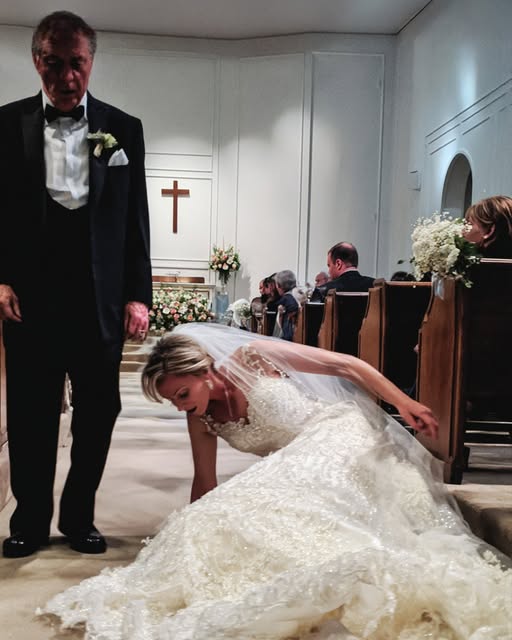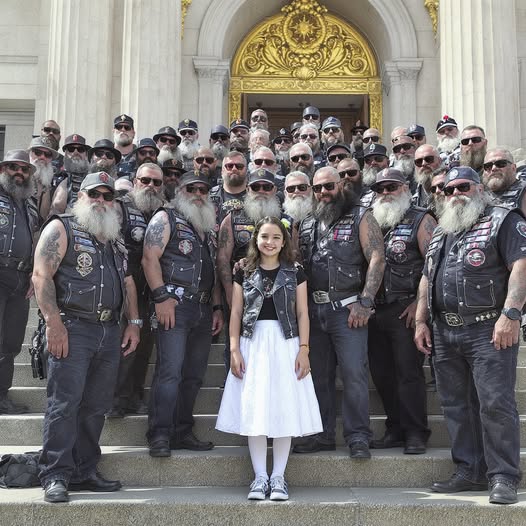My stepsister Hailey had spent my entire life making it clear I didn’t belong. From the first family dinner after my dad married her mother, she’d found ways to make me feel small—pushing me into corners, mocking me quietly, letting me think maybe, one day, she’d soften. I kept hoping. I told myself she’d grow out of it. Fifteen years later, at my wedding, she made sure everyone saw exactly who she was.
The morning of the ceremony, Hailey was uncharacteristically helpful. She offered to “handle the details,” called herself my big sister, fussed over centerpieces, and even insisted on handing me the bouquet as I walked down the aisle—a symbolic gesture she framed as passing the torch. For a moment, I let myself believe something had shifted.
The chapel was perfect. My father, Roger, stood beside me, eyes misty, proud. I took his arm and began down the aisle. Two hundred guests watched. Hailey waited just off the carpet, bouquet in hand, smiling like a sister. When we reached her, I reached for the flowers—and she tripped me. Her foot shot out with the precision of someone who had rehearsed humiliation. My heel caught, my ankle twisted, and I fell face-first onto the marble. The bouquet scattered. Gasps rippled through the room.
Hailey didn’t feign concern. She smirked, then, loud enough for everyone to hear, whispered, “Oops. Some people never learn to walk gracefully.” My father helped me up. He wiped dust from my dress, kissed my forehead, and walked me the rest of the way. I married Jacob with scraped knees and a crooked veil. Hailey floated through the reception, accepting sympathy for the “accident,” framing me as clumsy—while I kept my smile hollow and my rage quiet.
The next morning, my knees still throbbed. I went to my father’s house under the pretense of returning décor. Hailey had been called upstairs to his office. I heard his voice before I saw her—calm, controlled, and cold in a way I’d never heard him before. “Sit down, Hailey,” he said. I froze on the landing.
“You think I didn’t see what you did?” he asked. “You think I missed the way your foot shot out? The way you smiled when she fell?” Hailey protested it was an accident, but he didn’t let her deflect. He told her that family didn’t humiliate one another, that jealousy—not accident—drove her. Then he delivered the blow: the wedding gift he’d been planning for her—$155,000 toward the condo she’d wanted—was being redirected. “That check is going to Selena now,” he said. “She’s the one who fell and got back up without making a scene. She showed grace.”
Hailey left the room pale, mascara streaked, whispering, “This isn’t over,” but the fight had drained from her. My father appeared in the doorway with an envelope. “I should’ve done this a long time ago,” he said, admitting he’d tried too hard to smooth over blended-family tensions and in the process neglected to protect me. Inside was a check and a note: For the daughter who never stopped hoping, never stopped trying, and never stopped being kind.
I didn’t take it as about the money. It was acknowledgment. It was justice. It was the moment something that had been bleeding quietly for years finally began to heal.
Three months later, Jacob and I live in the home we bought with that gift. Hailey moved away shortly after the wedding. We haven’t spoken. People sometimes ask if I regret how things played out, if I wish I’d handled it differently. I’ve learned you can’t make someone love you, and you can’t build a family on one-sided forgiveness. My wedding wasn’t perfect. My stepsister tried to ruin it. What mattered was what happened after—the quiet reckoning in my dad’s office, the decision to stop waiting for her approval, and the choice to move forward with my own life.
That elevator of hope I rode for years finally opened. I didn’t need to fight her. I just needed to stop hoping she’d change. And in doing that, I reclaimed myself.


